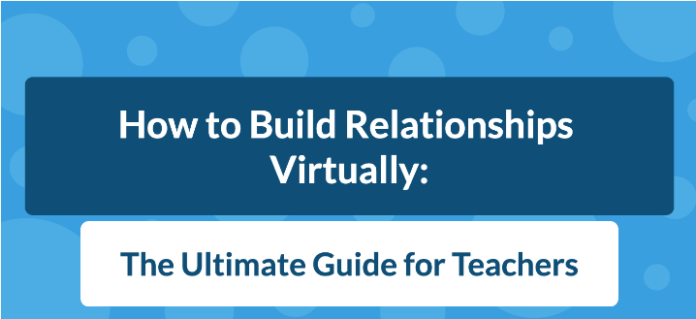One of the major differences between studying online and on-campus is the social aspect. While those who head to university often walk to classes with friends, meet new people at socials, or get to know the other students in their accommodation, e-learners completely miss out on the social side of studying.
But creating these relationships isn’t just important for making sure you’ve always got someone to hang out with; by creating connections with your peers, you’re able to help and support one another through tough assignments or last-minute cram sessions. It’s good knowing that others are in the same position as you, and you can lean on each other when things get difficult.
When studying off-campus, it can be difficult to create that supportive network with peers and teachers, as you’re all scattered across different cities, states, or even countries. What seems like trivial ‘water cooler talk’ for on-campus students can often be rich nuggets of information regarding misunderstood tasks or changes to deadline times.
Building relationships with other people on your course while studying online might seem unimportant – especially if you’re studying later in life and have other things going on. It might feel like a waste of time when you’re really only interested in completing the course and getting back to ordinary life.
But if something does go wrong or you’re stuck on something with a deadline looming, where will you turn for guidance?
And that’s just one example of why gaining relationships with other students – and your professors – is so important.
But how do you do it through a screen? How do you initiate conversations outside lectures, and how do you continue to nurture these relationships in a beneficial way?
Well, that’s what we’re going to discuss today.
LinkedIn is your secret tool
There are a huge number of ways you can use LinkedIn while studying online.
The first will be to scope out the professors. On the social platform, they’ll likely have their educational background and any papers they’ve had published. Finding materials they’ve studied or liked can help you find a common connection that can be used to start the conversation. You might even find out a little bit more about their hobbies and other out-of-school interests, which could be used as a link to get to know each other.
Another way to use LinkedIn is to connect with the rest of the students on the course. Send an invitation to just about anyone that you speak to during your academic years, as you’ll never know when you might need them. It might seem pointless or desperate at the time, but you could end up working together in the future or using them to bag yourself an interview for your dream role.
Students on your specific course can all be added to a group chat or group page so that everyone can talk or post questions. That way, everyone can stay on the same page while building a sense of community amongst you all.
Welcome dialogue
LinkedIn isn’t the only tool that’s available for building a community either. Most universities have their own networking site. Alternatively, pretty much everyone has Facebook these days – making it the perfect place to chat and discuss things with your peers.
Post on group message boards and ask questions to open up the dialogue. If you don’t have your own questions to ask, you might have a few answers useful to other people. By getting involved with other people’s posts, you’ll likely get a better sense of the types of people you should be/want to be connecting with.
Take part in extracurriculars
Just because you’re studying online doesn’t mean there aren’t extracurriculars to get involved with. DBA courses online will often invite students to additional webinars or presentations hosted by people from different industries. These will be on top of coursework, making it the perfect place to gain contacts from outside your current class.
It’s also worth trying to connect with the presenter too. They might own a business or work for someone within your industry – they might even be able to get you some work experience or a job. Make sure to stay on their radar by hitting that LinkedIn connect button and sending a message about how much you enjoyed their talk.
Offer, take, and apply feedback
You can build relationships with your lecturers by offering feedback on their modules. While this might seem a little out of your comfort zone, it’s a great way to grab their attention. Feedback doesn’t have to be only negative either. If you’ve enjoyed a particular class or are really interested in knowing more about a certain topic, let them know. They’ll be more than appreciative of positive feedback – professors and teachers definitely lack positive re-enforcement in their jobs!
You should also let them know when you struggled with assignments. This could lead them to explain it in a different way or offer feedback that you can use for the next project.
And, while we can all easily offer feedback, it’s much harder to take it. And even harder to apply it. However, in order to not only develop yourself but also to develop working relationships with your professors, you need to take all the feedback you can get. Showing that you’ve taken on board what they’ve said and applied it to your work will prove to them that you’re a student worth noticing.
Keep people in the loop
While some courses use video calls to host lectures, others will be pre-recorded modules that you can watch at your own leisure. Whichever way the course is run, you should keep tutors in the loop if you’re struggling to manage. There may be times when personal issues arise, and you’ll need to take a step back or need a little more support with some of the modules. Don’t suffer in silence; keep everyone in the know so that they can support or guide you when needed.
Leave on a good note
When you’ve finished the course, take a moment to email the professors to let them know you’ve enjoyed it. This is also the perfect chance to request any additional books, courses, or contacts they might have to offer.
Then, with contacts and qualifications in tow, you’ll be ready to take on the world.

















